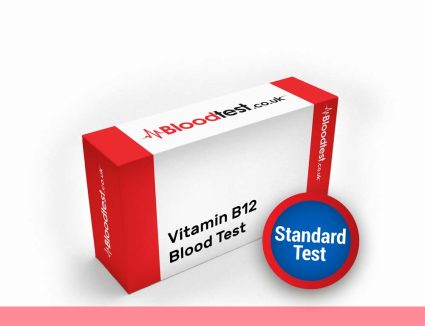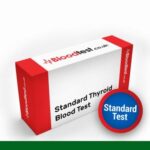Exploring the Importance of a Vitamin B12 Blood Test for Optimal Health
 Vitamin B12 plays a vital role in numerous bodily functions, particularly in sustaining nerve function and promoting the formation of red blood cells. Furthermore, it is integral to processes such as DNA synthesis and energy metabolism, highlighting its essential contribution to overall health. A vitamin B12 blood test in Aylesbury is crucial, as it provides accurate insights into your body's nutrient levels. This testing is essential for diagnosing deficiencies that could lead to significant health issues if not addressed promptly.
Vitamin B12 plays a vital role in numerous bodily functions, particularly in sustaining nerve function and promoting the formation of red blood cells. Furthermore, it is integral to processes such as DNA synthesis and energy metabolism, highlighting its essential contribution to overall health. A vitamin B12 blood test in Aylesbury is crucial, as it provides accurate insights into your body's nutrient levels. This testing is essential for diagnosing deficiencies that could lead to significant health issues if not addressed promptly.
Vitamin B12 deficiency can manifest in various ways, substantially impacting one’s quality of life. Common manifestations include persistent fatigue, extreme weakness, and cognitive difficulties such as trouble concentrating. Gastrointestinal issues may also arise, presenting as symptoms like constipation, diminished appetite, and unintended weight loss. While these symptoms might initially appear minor, their cumulative effect can escalate into severe health risks if not treated in a timely manner. A vitamin B12 blood test in Aylesbury delivers precise measurements to confirm deficiencies, facilitating early medical intervention.
Recognising which groups should be tested for Vitamin B12 deficiency is of paramount importance. Older adults are particularly at risk due to a natural decline in nutrient absorption efficiency that occurs with age. Moreover, individuals following vegan or vegetarian diets may find it challenging to acquire adequate B12, as this vitamin is primarily sourced from animal products. Additionally, people with gastrointestinal disorders, such as Crohn’s disease or celiac disease, often experience compromised absorption, making routine testing crucial. Identifying these risk factors is essential for effective testing and treatment.
The Essential Contributions of Vitamin B12 to Overall Health
Vitamin B12 is indispensable for upholding optimal nerve function. It significantly contributes to the formation of the myelin sheath, which acts as a protective layer around nerves, ensuring efficient signal transmission between the brain and the rest of the body. In addition, this nutrient is critical for red blood cell production, which helps prevent conditions such as megaloblastic anaemia, characterised by the generation of large and dysfunctional red blood cells. The repercussions of Vitamin B12 deficiency extend beyond physical symptoms; they can adversely affect mental health, potentially leading to depression, cognitive decline, and memory impairment. Acknowledging the multifaceted benefits of Vitamin B12 underscores the necessity of regular testing, especially for those at risk.
Recognising the Signs and Symptoms of Vitamin B12 Deficiency

The symptoms linked to a Vitamin B12 deficiency can be extensive and often overlap with other health conditions, making accurate diagnosis vital. Fatigue is frequently the most common complaint; individuals may find it challenging to perform routine tasks and experience overwhelming tiredness. Neurological symptoms can be particularly concerning; sensations of numbness or tingling in the extremities may indicate nerve damage that has developed over time. It is vital to recognise that these signs can gradually develop and may not always be immediately noticeable. Such subtle indicators can easily be overlooked without regular blood tests, potentially leading to more severe health complications.
As the deficiency progresses, cognitive difficulties may emerge, including issues with memory retention and concentration. Mood changes, such as increased irritability and feelings of depression, may also occur. For individuals facing unexplained health concerns, a vitamin B12 blood test in Aylesbury could be a crucial first step in diagnosing these symptoms, leading to appropriate interventions and treatment options.
Determining Who Should Consider Testing for Vitamin B12 Deficiency
Certain demographics should actively contemplate scheduling a Vitamin B12 blood test. Older adults, particularly those over 60, are at a heightened risk of deficiency due to age-related changes in nutrient absorption. Vigilance regarding B12 levels is especially essential for vegans and vegetarians, as their dietary choices may lack sufficient sources of this vital vitamin. Regular testing is important for these groups to monitor their nutrient levels and prevent deficiency-related health issues.
Individuals suffering from gastrointestinal disorders, such as Crohn’s disease or celiac disease, also face challenges in absorbing Vitamin B12, making consistent testing a crucial aspect of their healthcare management. Similarly, patients who have undergone weight loss surgery may require periodic evaluations to maintain adequate nutrient levels post-operation. By identifying and testing at-risk populations, healthcare providers can proactively address potential deficiencies before they escalate into more severe health challenges.
Locating a Reliable Vitamin B12 Blood Test in Aylesbury

Residents of Aylesbury have several options for obtaining a vitamin B12 blood test. Knowing where to go for testing can significantly ease the process and provide timely results. Local GP services, private clinics, and pharmacies all offer viable avenues for testing, each with its unique blend of convenience and accessibility.
Leveraging Local GP Services for Comprehensive Testing
Most general practitioners in Aylesbury offer vitamin B12 blood tests as part of routine health assessments or upon patient request. Visiting your GP is often the most straightforward and dependable option, as they can provide a thorough health evaluation alongside the test. If your doctor suspects a deficiency based on your symptoms or medical history, they can recommend further testing and tailored treatment plans that align with your specific health needs.
Furthermore, GP services are generally associated with the NHS, which means you may not incur additional costs if testing is deemed medically necessary. It is advisable to check with your local surgery regarding appointment availability and any specific requirements they may have concerning testing procedures.
Investigating Private Clinics for Rapid Results
Numerous private healthcare facilities in Aylesbury provide vitamin B12 testing for those seeking faster results or a more confidential experience. These clinics often offer the convenience of walk-in appointments, which can be particularly advantageous for individuals with busy lifestyles. The private sector typically facilitates a more streamlined process, with results often available within 24 to 48 hours, providing reassuring feedback for patients anxious about their health.
While private testing might involve out-of-pocket expenses, many individuals find the convenience and speed worthwhile, especially if they urgently require testing. Before selecting a clinic, it is prudent to research its credentials and ensure it complies with local health regulations to guarantee the quality of care.
Embracing the Convenience of Mobile Testing Services

Innovative mobile testing services are gaining popularity, simplifying the process for Aylesbury residents to undergo testing without the hassle of travelling to a clinic. These services often provide at-home testing, offering a convenient alternative for individuals with mobility difficulties or those who prefer to avoid crowded waiting areas.
The home testing process typically entails a qualified healthcare professional visiting your home to perform the blood draw, which can be particularly reassuring for individuals who feel anxious in medical environments. Results are often delivered electronically after the test, ensuring timely feedback without the need for additional follow-up appointments.
Accessing Quick Testing Through Pharmacies
In recent years, many pharmacies in Aylesbury have expanded their services to include health checks, including vitamin B12 blood tests. These walk-in services provide a convenient option for those needing rapid and accessible testing. The process is generally straightforward, with results typically available within a short timeframe, enabling patients to make informed health decisions swiftly.
Testing through pharmacies is particularly appealing to individuals who prefer a less formal setting than a doctor's office or are simply seeking a quick solution. It is advisable to contact the pharmacy to confirm availability and any associated costs, as services may vary by location.
Essential Steps for Preparing for Your Vitamin B12 Blood Test
Preparing for a vitamin B12 blood test in Aylesbury is relatively uncomplicated; however, specific important considerations must be addressed to guarantee the accuracy and reliability of your results. Proper preparation can help avoid unnecessary complications and facilitate a smooth testing experience.
Clarifying Fasting Requirements Prior to Testing
In general, fasting is not a prerequisite for a vitamin B12 blood test. However, it is wise to confirm with your healthcare provider beforehand, as they may have tailored instructions based on your individual health profile. While fasting may be necessary for other types of blood tests, Vitamin B12 testing typically does not require it, thereby simplifying scheduling for patients.
Being aware of the testing requirements will not only alleviate anxiety but also ensure that you can continue with your day without the interruptions that fasting might entail.
Discussing Medications and Supplements with Your Doctor
Before undergoing a vitamin B12 blood test, it is crucial to inform your healthcare provider about any medications or supplements you are currently taking. Certain medications can interfere with the absorption of B12 or affect blood levels, potentially leading to misleading test results. For instance, long-term usage of proton pump inhibitors can inhibit B12 absorption, while other medications may artificially elevate or lower B12 levels.
Maintaining an accurate list of all supplements and over-the-counter medications will aid your doctor in interpreting your test results more effectively. This information is vital for developing an appropriate treatment plan should a deficiency be detected.
What to Anticipate During the Blood Test Procedure
The vitamin B12 blood test is a straightforward procedure typically involving a blood draw from a vein in your arm. The entire process is quick, usually completed within a few minutes. A healthcare professional will disinfect the area with an antiseptic, apply a tourniquet to engorge the vein, and then insert a needle to extract the blood sample.
While some individuals may experience slight discomfort during the draw, the procedure is generally well-tolerated. Once the sample is collected, it will be dispatched to a laboratory for analysis to evaluate B12 levels. Depending on the testing facility, patients can expect to receive their results within a few days.
Pre-Test Preparation the Day Before
Consider staying well-hydrated the day prior to your blood test to ensure the most accurate results. Drinking plenty of water can make the blood draw easier and more comfortable for both you and the healthcare professional. Additionally, it is advisable to avoid any strenuous exercise the day before, as this could impact your metabolism and potentially skew the results.
If your healthcare provider has given specific instructions or preparation guidelines, it is crucial to follow them carefully. This preparation will yield more accurate results, contributing to better health outcomes.
Understanding and Interpreting Your Vitamin B12 Test Results
Interpreting the results of your vitamin B12 blood test in Aylesbury is essential for comprehending your health status and determining the necessary steps for treatment or ongoing monitoring. Familiarising yourself with the normal ranges and possible outcomes can empower you to take charge of your health effectively.
Recognising Normal Vitamin B12 Ranges
Typically, the normal range for Vitamin B12 levels in the bloodstream ranges from 200 to 900 picograms per millilitre. However, these values may vary slightly depending on the specific analysis laboratory. Understanding where your levels fall within this spectrum can provide crucial insights into your health.
If your results fall within the normal parameters, immediate action may not be required. However, if your levels are borderline or below normal, it may indicate the need for further investigation. Regular testing can help track your levels over time, ensuring that any fluctuations are promptly addressed.
Interpreting Low Vitamin B12 Levels and Their Implications
If your vitamin B12 blood test reveals low levels, it may signify a deficiency that requires further exploration. Low B12 levels could suggest inadequate dietary intake, absorption difficulties, or other underlying health issues. Your doctor may recommend additional tests to identify the root cause of the deficiency, which could include assessments for intrinsic factor antibodies or a complete blood count to evaluate red blood cell production.
Understanding the implications of low B12 levels can guide you towards appropriate treatment options. If diagnosed early, deficiencies can often be effectively managed, preventing more serious health complications in the future.
Determining When to Consider Retesting for Vitamin B12 Levels
Your healthcare provider may suggest retesting your Vitamin B12 levels if your initial results are borderline or if you have started treatment for a deficiency. Regular follow-up tests are crucial for monitoring progress and ensuring effective treatment. Depending on the severity of the deficiency and your treatment approach, retesting may be scheduled within a few months to observe any improvements.
Keeping track of your Vitamin B12 levels is a proactive measure towards maintaining your health. Being informed about your results empowers you to make educated decisions regarding dietary adjustments or supplements as necessary.
Exploring Treatment Options for Vitamin B12 Deficiency
If you receive a diagnosis of Vitamin B12 deficiency, various treatment options are available to restore your levels and enhance your health. Understanding these options can assist you in making informed decisions about your care.
Implementing Dietary Adjustments to Combat Deficiency
Dietary modifications represent one of the most natural and effective methods to address Vitamin B12 deficiency. Increasing your intake of Vitamin B12-rich foods can significantly boost your levels. Foods such as meat, fish, dairy products, and fortified cereals are excellent sources of this essential nutrient.
For individuals adhering to a vegetarian or vegan diet, it is particularly crucial to explore fortified food options or consider supplementation, as plant-based sources of B12 are limited. For instance, nutritional yeast is a popular vegan-friendly source of B12 that can be seamlessly incorporated into various dishes for an additional nutrient boost.
Consulting with a registered dietitian can provide personalised guidance on crafting a balanced diet that meets your nutritional needs while effectively addressing any deficiencies.
Considering the Role of Supplements in Treatment
If dietary changes alone are insufficient to rectify a deficiency, your doctor may recommend oral supplements or injections as part of your treatment plan. Oral supplements are typically effective for individuals with mild deficiencies or who prefer a non-invasive approach. However, in cases of severe deficiencies or for those with absorption issues, B12 injections may be the more suitable option, delivering the nutrient directly into the bloodstream for immediate effect.
Adhere to your healthcare provider’s recommendations regarding supplementation. They can tailor a treatment plan that aligns with your specific health needs and lifestyle considerations.
The Importance of Regular Monitoring and Follow-Up
Consistent follow-up tests are critical for effectively managing Vitamin B12 deficiency. Your healthcare provider will likely schedule retesting to monitor your levels after initiating treatment. This allows for timely adjustments to your treatment plan, whether increasing the dosage of supplements or making further dietary changes based on your progress.
Maintaining an open dialogue with your healthcare provider about your symptoms and any challenges you encounter will contribute to a more successful treatment journey, ensuring that you receive the most effective care possible.
Exploring the Benefits of Nasal Sprays for Vitamin B12 Administration
Vitamin B12 nasal sprays offer an alternative method for administering this essential nutrient to individuals who find it challenging to take oral supplements or receive injections. Nasal sprays can be especially beneficial for those with gastrointestinal issues that hinder absorption. This method allows for direct absorption through the nasal mucosa, bypassing the digestive system entirely, which can enhance efficacy.
Discussing the option of nasal sprays with your healthcare provider can reveal new pathways for effectively managing your Vitamin B12 levels, ensuring you discover the treatment that best aligns with your lifestyle and health status.
Implementing Lifestyle Modifications for Enhanced Treatment Success
Adjusting lifestyle factors can significantly improve the effectiveness of Vitamin B12 treatments. For example, reducing alcohol consumption and quitting smoking can enhance your body's ability to absorb essential nutrients, including B12. These lifestyle changes facilitate better nutrient levels and contribute positively to your overall health and well-being.
By making informed choices regarding your lifestyle and diet, you can bolster the success of your treatment and work towards optimal health outcomes. Prioritising wellness is a fundamental aspect of comprehensively addressing Vitamin B12 deficiency.
Understanding the Costs and Insurance Coverage for Vitamin B12 Tests in Aylesbury
When considering a vitamin B12 blood test in Aylesbury, it is vital to grasp the associated costs and available insurance coverage options. These factors can significantly influence your decision regarding where and how to obtain testing.
Understanding NHS Coverage for Vitamin B12 Testing
In many cases, vitamin B12 blood tests may be covered by the NHS if deemed medically necessary by your healthcare provider. If you display symptoms associated with deficiency or have risk factors such as age or dietary restrictions, your GP may recommend testing as part of your routine healthcare.
It is essential to discuss your concerns with your doctor, who can provide a referral for testing under the NHS, ensuring you receive the necessary care without incurring out-of-pocket expenses.
Exploring Private Insurance Coverage Options for Testing
If you choose to pursue private testing, many health insurance policies in Aylesbury may cover the cost of vitamin B12 blood tests. However, coverage can vary significantly based on your policy's specific terms and conditions. Before scheduling a test, it is advisable to contact your insurance provider to clarify what is included under your plan.
Understanding your insurance options can empower you to make informed healthcare decisions and help you avoid unexpected costs. If your plan does not cover testing, reviewing the fees associated with private clinics will assist you in selecting a service that aligns with your budget.
Empowering Yourself with Knowledge About Vitamin B12 Health
Navigating the complexities of health can be challenging, but understanding the significance of a vitamin B12 blood test in Aylesbury is essential for maintaining your overall wellness. From recognising the symptoms of deficiency to understanding where to obtain testing and interpreting the implications of your results, knowledge is power in managing your health effectively.
With various options for testing and treatment readily available, residents of Aylesbury can take control of their Vitamin B12 status. Continuous monitoring, lifestyle adjustments, and dietary changes can lead to improved health outcomes and an enhanced quality of life.
Commonly Asked Questions (FAQs) Regarding Vitamin B12 Testing
What is the purpose of a vitamin B12 blood test?
A vitamin B12 blood test measures the levels of Vitamin B12 in your bloodstream to establish whether you have a deficiency that could adversely affect your health.
How often should I get tested for vitamin B12 deficiency?
The frequency of testing depends on individual risk factors; however, those at heightened risk may benefit from annual testing or more frequent assessments should symptoms arise.
Are there risks associated with a vitamin B12 blood test?
The risks are minimal; however, some individuals may experience slight discomfort or bruising at the site of the blood draw.
Can I take vitamin B12 supplements before the test?
It is important to inform your healthcare provider about any supplements you are taking, as they can influence the accuracy of test results.
What steps should I take if my test results indicate a deficiency?
Consult your healthcare provider for tailored recommendations regarding dietary changes, supplements, or treatments based on your specific situation and health requirements.
Do I need a referral for a vitamin B12 blood test?
A referral from your GP is typically necessary to obtain testing through the NHS. Private testing may not require a referral.
How long does it take to receive test results?
A vitamin B12 blood test result is usually available within a few days, although this timeframe may vary depending on the testing facility.
What are the primary dietary sources of vitamin B12?
Rich dietary sources include meat, fish, dairy products, and fortified cereals. Those following vegan or vegetarian diets may need to seek out fortified foods or consider supplementation.
Can lifestyle changes assist in improving vitamin B12 levels?
Lifestyle modifications such as increasing the intake of B12-rich foods, reducing alcohol consumption, and quitting smoking can enhance nutrient absorption and overall health.
Are there specific populations at higher risk for vitamin B12 deficiency?
Indeed, older adults, vegans, vegetarians, and individuals with gastrointestinal disorders face a heightened risk of Vitamin B12 deficiency.


